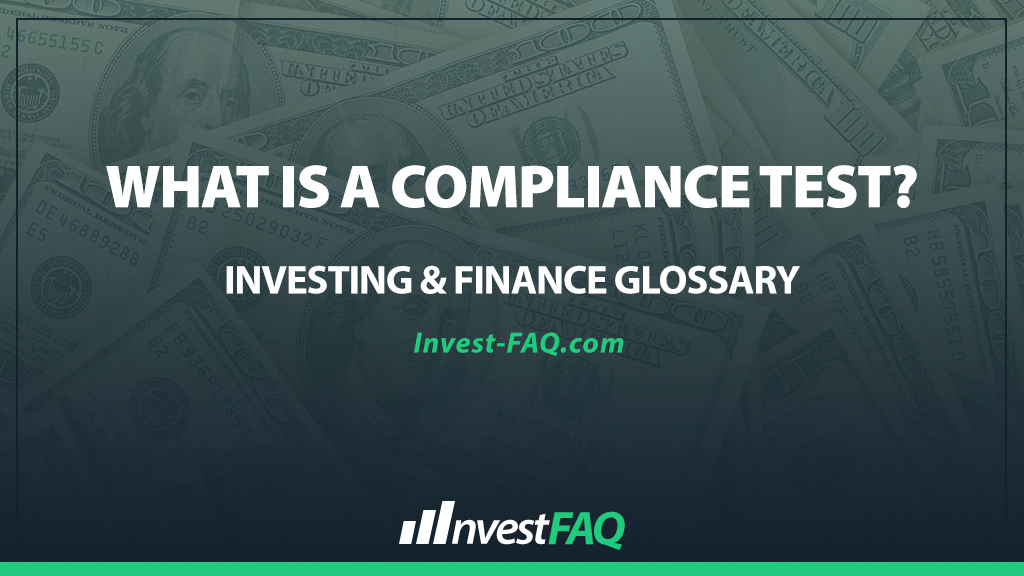
Compliance Test
Contents
A compliance test is an evaluation process designed to determine whether a business’s financial transactions, operations, and control systems adhere to relevant laws, regulations, and internal policies. It assesses the effectiveness of a company’s internal controls in ensuring compliance and identifying areas of risk or non-compliance.
Compliance tests are used by businesses to proactively manage and mitigate compliance risks, ensuring that operations align with legal requirements and industry standards.
This process is crucial for maintaining corporate integrity, protecting against financial penalties, and sustaining operational licenses.
Regular compliance testing forms part of a comprehensive risk management strategy, supporting ongoing regulatory compliance and reinforcing stakeholder confidence.
Example of a Compliance Test
“HealthSafe Inc.,” a pharmaceutical company, must comply with strict regulations regarding the safety and efficacy of its products. To ensure compliance with the Food and Drug Administration (FDA) regulations, the company conducts a compliance test focusing on its drug testing and approval processes:
Review of Documentation: Ensuring all drug trials are properly documented and reported according to FDA guidelines.
Verification of Procedures: Checking that safety protocols are followed during drug testing phases.
Audit of Reporting Mechanisms: Examining the processes for reporting adverse drug reactions to regulatory authorities.
In “HealthSafe Inc.’s” scenario, the compliance test involves a thorough review of the company’s drug development and testing procedures against FDA regulations.
This includes checking that all necessary documentation is complete and accurate, safety protocols are strictly adhered to, and adverse reactions are promptly and correctly reported.
The purpose of this test is to identify any areas where the company’s processes may not fully comply with regulatory standards, allowing HealthSafe to address these issues proactively and avoid potential regulatory penalties.
Significance for Investing & Finance
The role of compliance tests in accounting and business operations is significant due to several factors:
Risk Mitigation: Compliance tests help identify and rectify potential areas of non-compliance before they lead to legal or financial consequences.
Operational Integrity: Regular testing reinforces a culture of compliance and integrity, ensuring business processes align with regulatory requirements and ethical standards.
Financial Reporting Accuracy: By ensuring compliance with financial regulations, compliance tests contribute to the accuracy and reliability of financial reporting, which is crucial for investor confidence and market stability.
Strategic Decision-Making: Insights gained from compliance tests can inform strategic decisions, helping businesses navigate regulatory environments and plan for future compliance needs effectively.
In summary, compliance tests are a critical element of a company’s internal control and risk management systems.
They provide essential assurances that business operations comply with necessary legal and regulatory standards, thereby protecting the company from potential penalties and enhancing its reputation among stakeholders.
Through diligent testing and evaluation, businesses can maintain operational integrity and foster a culture of compliance that supports long-term success.
FAQ
What is the purpose of a compliance test in the context of internal auditing?
A compliance test, in internal auditing, aims to evaluate the adherence of an organization’s procedures and processes to internal policies or regulatory standards, ensuring that the organization operates within legal and procedural boundaries.
How does a compliance test differ from a substantive test in auditing?
While a compliance test assesses the effectiveness of controls and procedures in meeting regulations and policies, a substantive test verifies the accuracy of financial information and transactions to detect material misstatements or fraud.
What are common areas covered by compliance tests in a financial audit?
In a financial audit, compliance tests frequently examine areas such as financial reporting, data protection, anti-money laundering procedures, and tax compliance to ensure regulations are properly followed.
Can compliance testing be automated, and if so, how?
Yes, compliance testing can be automated using specialized software that continuously monitors and evaluates control measures against regulatory requirements and standards, improving efficiency and reducing the likelihood of human error.
